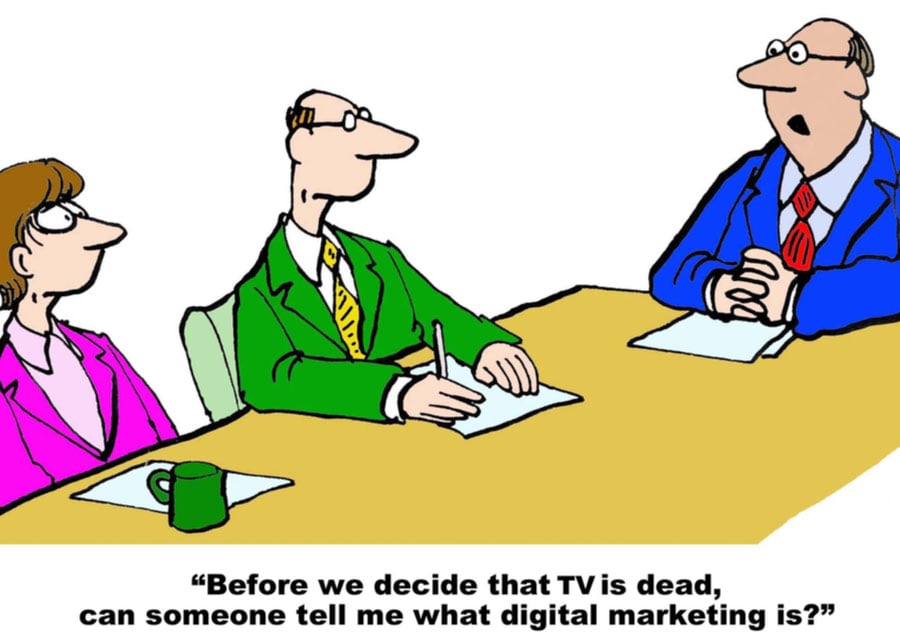What Skills Should My In-House Marketing Team Have?
Executive Summary
For your B2B company to compete successfully, digital marketing is a must. Your strategy should be built around the 12 core skills that are detailed below. Because no single person has all 12 of these skills, the digital marketing that will move the profitability needle requires a team.
Given the budget restraints of small to medium companies, hiring a marketing team is just not realistic–salaries continue to rise without an end in sight, and if you want the best, you are going to have to pay a hefty base salary, not to mention offer fantastic benefits.
Marketing looks easy, but it’s much more difficult than you think and becomes more complicated by the day. Customer needs and wants change, along with the platforms where you can reach them, and then there’s the question of what’s going to work for your specific business. Marketing is not a one-size-fits-all proposition, and just keeping up with potentially lucrative opportunities to get your message out there is a full-time job.
A smarter approach to success is to hire someone who is a Strategist or Marketing Project Manager who can partner with outside resources when you need them. That way, you get the skills you need from experienced professionals without a hiring binge. You save money, and you get great work. What could be better?
Contents
12 skills of digital marketing
You can see that one person can’t do it all
Do you know what it costs to bring these skills in-house?
Manage the strategy, outsource the skills
12 skills of digital marketing
Marketing Strategist
A marketing strategist understands the company's overall goals and develops a marketing roadmap to get the company where it wants and needs to go. These are typically “big picture” people, and while they are familiar with the 12 skills, they typically do not have an in-depth knowledge of the skills required to execute tactics.
Copywriter
There is truth to the saying “content is king.” Writing great content (like web copy, sales sheets, and eBooks) is a specialized skill and is the key to a successful online presence. Great content leads to more traffic, conversions, and, ultimately, sales.
Blogger
This may sound the same as the copywriting skill, but it actually goes deeper. Copywriters are typically skilled in creating catchy, sales-oriented content. Bloggers fall somewhere between copywriters and journalists. Blogs are longer-form content that should be written in a way that educates and inspires the reader. They are not sales documents. Blogs require a lot more research and better adherence to grammatical standards. That’s not to say your copywriter can’t blog or vice-versa, but there are different skills required for each task.
Analytics & Data Analysis
The “pioneer of marketing,” John Wanamaker, once said, “Half the money I spend on advertising is wasted; the trouble is I don’t know which half.” In the early 20th century, he was absolutely right. But today, everything is trackable. There is no excuse for not knowing if what you are doing is moving the needle and by how much. The modern marketing team must be able to analyze, dissect, and interpret massive amounts of data from a variety of sources. Marketing is a data-driven activity, and it’s not “arts and crafts.” You’ll need someone with solid analytical skills who can produce actionable data.
Web Developer
Between mobile responsiveness, browser compatibility, site speed, security, and changes to coding best practices, your website is a constantly evolving entity. Your web team must know HTML, CSS, Javascript, JQuery, XML, PHP, and more, as well as keep up with the next big thing.
Web Designer
Web design is not web development. While web development focuses on the backend—the coding side of your site, web designers cast a creative, keen eye on the front end. Design is about how the site looks. Is it appealing? Is it easy to navigate? Is all the content present? Does it follow branding guidelines? Your Developer is your “code junkie,” and your Designer is a creative artist with a focus on your all-important user experience (UX).
Search Engine Optimization (SEO)
A beautiful website with compelling content is a real disappointment and a waste of your hard-earned cash if your prospects can’t find it. SEO is a tricky beast. It constantly changes, and with machine learning, it is evolving faster than ever before. SEO experts must work closely with your Web Designer, Copywriter, and Blogger to make sure every corner of your website is optimized and keyword-focused.
Pay-Per-Click (PPC) Marketing Specialist
In an ideal world, SEO and content would drive all the traffic you need to your website. People prefer organic links more than paid ones: about 70% of search clicks are organic. But when it comes to speed, PPC has the clear advantage over organic. Achieving success organically takes months—sometimes years—but with PPC, you can own the top position on Google within hours. This drives revenue when you’re starting up and gives you an advantage when executed properly. Inexperience with PPC typically results in a lot of money spent with nothing to show for it.
Conversion Rate Optimization Specialist
Every industry has a market cap: the volume of people looking for your products or services on a regular basis. For instance, if you provide document scanning services in Delaware, there are only about 60 people each month looking for your services. When you can’t get more people to your site, it’s imperative that you make the most of those who do visit. This is called conversion rate optimization. It’s the systematic process of making small, measurable changes to test whether or not they result in more leads. It’s a combination of strategy, copywriting, analytics & data analysis, and web design.
Email Marketing
One of the oldest digital marketing tools is still one of the best. When used correctly, email marketing is one of the most powerful tools to inform and convert leads into paying customers. But email marketing, like everything else on this list, is a skill. There is a lot of analysis involved in email marketing–it’s important to test and measure everything from the subject line, message content, length, layout, and even the day/time you send it. Effective email marketing is more difficult than you think.
Social Media Manager
Depending on your industry, social media may be a great tool for engaging your prospects and driving leads to your website. We’ve all seen horror stories about social media account managers going rogue and damaging a brand with a single tweet. On top of that, navigating social media algorithms is a challenge all on its own. Building, fostering, and retaining a loyal social media following is a full-time job.
Project Manager
To be successful, marketing is a massive, ongoing project with many moving parts. If someone isn’t coordinating every part, it will quickly become disjointed, fall behind schedule, and fail to meet your expectations. A project manager doesn’t know how to perform all the other 11 skills, but they know project complexity and what it takes to get the job done.
You can see that one person can’t do it all
Sure, there is an overlap in the above skills, and you don’t need 12 people on your marketing team to make it a success. But you are not going to find one person who is competent (much less expert) in all 12 of these skills. In a pinch, you can get this team down to 4 people, but at the same time, you may be limiting your potential for success. No one is a true Jack or Jill of all trades, and something somewhere is going to suffer and keep your company from reaching its full potential.
Role |
Skills |
|
VP of Marketing |
Marketing Strategy, Project Management |
|
Content Marketing Manager |
Copywriting, Blogging, Web Design, Email Marketing, Social Media Management |
|
Full-Stack Web Developer |
Web Design, Web Development, Analytics & Data Analysis |
|
SEO Manager |
Search Engine Optimization, PPC Marketing, Conversion Rate Optimization |
What does it cost to bring these skills in-house?
Terrific – we’ve whittled the list down to a bare minimum of 4 people. That’s not so bad, right? Well, how deep are your pockets? Let’s say you work in a metropolitan area and have access to these highly skilled people. You’ll be competing for their talents. According to PayScale, you can expect to pay these annual salaries:
Role |
Low |
Average |
High |
|
VP of Marketing |
$93k |
$150k |
$208k |
|
Content Marketer |
$45k |
$67k |
$98k |
|
Full-Stack Developer |
$48k |
$75k |
$113k |
|
SEO Manager |
$49k |
$73k |
$110k |
TOTAL |
$235k |
$365k |
$529k |
Manage the strategy, outsource the skills
Let’s be real. Most small to mid-size B2B companies can’t afford $365,000/year for a marketing team, particularly when you don’t need all of those skills all of the time. This is why most businesses bring in a Marketing Coordinator ($47k/yr average salary) to oversee the project management and coordination of the plan while partnering with the right resources to get the job done.
For an average investment of about $96k/yr for outsourced marketing services, you access the skills you need to grow your business. Hire a dedicated marketer in-house who knows how to align your projects with your strategic goals. Then get the full value out of your in-house marketing person by equipping them with a smart, savvy team. It’s a solid strategic investment that actually saves you money.
Table of contents
Share this
You May Also Like
These Related Stories

A B2B Guide on How to Grow Your Business Through Digital Marketing

Delivering Value During the Marketing Process
